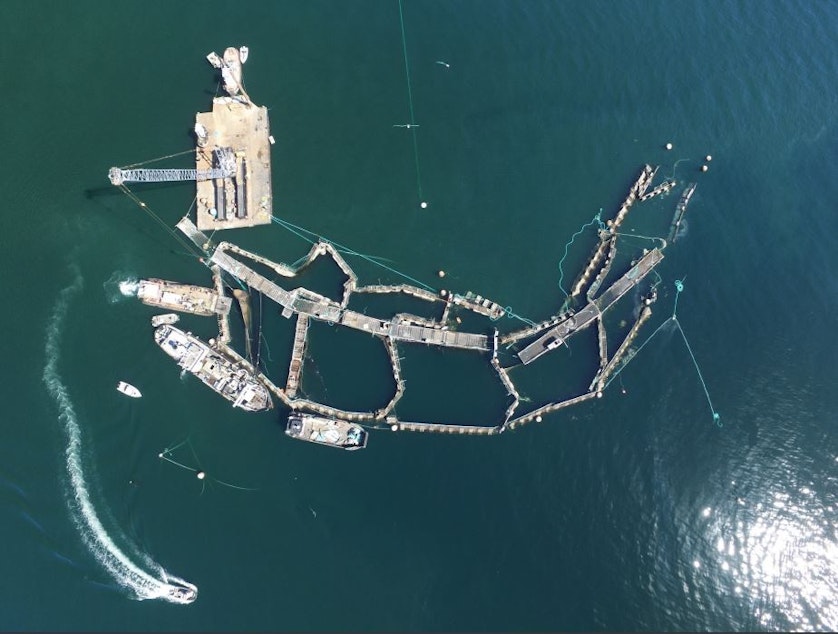Legislators want answers – and maybe a ban – on Atlantic salmon farms

Officials with the company that spilled nearly 160,000 Atlantic salmon into Puget Sound in August say there has been no evidence the spill has done damage to the sound.
State officials agreed with that assessment at a legislative hearing in Olympia.
But nobody could say why a salmon farm near Anacortes collapsed in the first place.
"What happened that caused the failure of the net pens of Cypress Island?" Republican Rep. Jim Walsh of Aberdeen asked after hearing agency and company presentations that did not answer that question.
“We know the moorings and mooring points failed. We do not know the precise reason yet, and we’re working with state agencies here today to identify those root causes,” Innes Weir with Canadian company Cooke Aquaculture replied.
Sponsored
Weir said the steel cage that collapsed was 15 or 16 years old with an expected lifespan of 20 years.
The Washington Department of Ecology had ordered Cooke on Sept. 15 to provide a detailed analysis of the root causes of the August collapse, and of a similar though less serious accident in July, by Oct. 30.
The company told Ecology that investigations of the catastrophic August collapse were ongoing and it had done no formal investigation of the July incident in which 10 anchor lines broke.
“We believe that that incident is tied to the August incident,” Amy Windrope of the Washington Department of Fish and Wildlife said at Thursday’s hearing of the House Agriculture and Natural Resources Committee.
'We need to be more aggressive'
Sponsored
State officials said Thursday they should have been "more aggressive" when responding to the August collapse despite Cooke’s initial estimate that only about 5,000 out of 305,000 fish had escaped.
“There’s a rule of thumb that whenever someone in an oil spill event says there’s 10 gallons spilled, there’s probably 10 times that amount,” Rich Doenges with the Washington Department of Ecology said. “If there’s a report of escaped Atlantic salmon, and they say it’s about a thousand, it’s likely to be much more. We need to be aggressive and get on the scene.”
The state set up its multiagency “unified incident command,” similar to the response for an oil spill, on Aug. 26, a week after the fish farm started to tear apart. The Lummi Nation had declared an emergency on Aug. 24, and tribal fishing boats had been chasing down escaped Atlantic salmon for days at that point.
“Kudos need to go to area tribes,” Doenges said. Lummi Nation chair Jeremiah Julius said Lummi boats alone caught 400,000 pounds of the escaped fish.
“The bottom line is that the majority of the fish were accounted for, but that still left over 100,000 fish swimming in Puget Sound,” Doenges said.
Sponsored
Empty stomachs
Weir told the hearing that there’s been no sign of Atlantic salmon eating, spreading disease or spawning in the wild.
Amy Windrope with the Washington Department of Fish and Wildlife said assessments of captured fish by the state and by the Northwest Indian Fisheries Commission had similar findings.
“There was no sign of bacteria, virus or parasites on them,” Windrope said.
Tribes and wild-salmon advocates had warned the escaped fish could compete with, prey upon or spread disease to local fish.
Sponsored
“All of the fish that stomachs have been sampled have been empty, except for one,” Windrope said. “When they look at the dead fish, what they see is that they are actually starving.”
But Lummi chair Julius said the Atlantic fish have no place here, either swimming free or in cages.
“Legislation is needed to protect the Salish Sea from this company,” Julius said. “There needs to be a stop to breeding invasive species and pollutants in our waters.”
“Our way of life is dependent on continued existence of native salmon,” Julius said. “We still spend and invest millions of dollars to try to preserve and protect and not allow these things that are sacred to us to go extinct.”
Democratic Rep. Brian Blake of Aberdeen predicted that the legislature will be discussing fish farms more in the upcoming legislative session.
Sponsored
Democratic Sen. Kevin Ranker of Orcas Island told KUOW he’s more concerned about day-to-day impacts of salmon farms than this one big escape.
“The feces coming out of these, the disease coming out of these,” Ranker said. “All this is in a water body that is already threatened. This is not a place where you take a risk.”
Ranker said there is “massive bipartisan support” in Olympia for his proposal to end Atlantic salmon farming in Washington waters as soon as current farms’ leases with the Washington Department of Natural Resources expire in 5 to 7 years.
Cooke officials said more than half the world’s seafood comes from fish farms and portrayed their Atlantic salmon farms as a local, sustainable food source.
“Aquaculture helps fill the need for growing high-quality protein while having a smaller carbon footprint, and at same time using less natural resources like fresh water, than other terrestrial proteins,” Cooke vice-president Michael Szemerda said.
New Brunswick, Canada-based Cooke is the United States’ only producer of farmed salmon, with operations in Washington and Maine.

